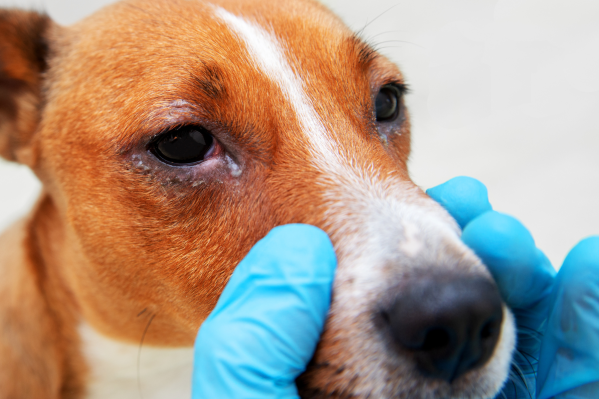Red, irritated, and itchy eyes can be extremely uncomfortable for dogs, regardless of the cause. It's very important to work with your vet to try to establish the reason behind the irritation, because correct treatment is needed to prevent complications that can sometimes be serious enough to affect your pet’s vision.
If you're wondering why your dog's eyes are red and itchy, we're here to help. We chatted with Dr. Mari Van Deventer, DVM at Pawp about what causes eye infections and how a veterinarian will approach treatment.
Causes for eye irritation in dogs
There are several potential causes for irritated eyes and the symptoms will vary according to the cause. Some of the more common causes for eye irritation and their associated symptoms include:
Foreign body
Conjunctivitis
Corneal ulcer
Glaucoma
Dry eye (KCS)
Other
Foreign body
A foreign body in the eye can be anything from a small piece of a leaf or grass blade to a splinter, or even an insect like a midge that has flown into your pet’s eye. In most instances, this will only affect one eye. Symptoms can include pinching of the affected eye, a watery or mucous discharge, rubbing or scratching the eye, and red conjunctiva and sclera (the white part of the eyeball).
Conjunctivitis
The symptoms of conjunctivitis often include swollen and red eyelids and conjunctiva, pinching of the eyes, and a discharge from the eyes. The discharge can vary in appearance depending on the cause for the conjunctivitis. A clear, watery discharge often indicates allergies or a viral infection. A yellow or green pussy discharge can indicate a bacterial infection. In some cases of conjunctivitis, the sclera (white part of the eye) can be red and irritated, but in other cases it will be unaffected.
Corneal ulcer
A corneal ulcer is in essence a small wound of the outer clear membrane at the front of the eye. The cornea is made up of three layers and the severity of the ulcer will depend on how deep the ulcer is and how many layers are affected.
Corneal ulcers can be caused by trauma to the eye, a foreign body scratching the surface, an abnormality of the corneal cells, or chemical burns from something like shampoo getting into the eyes. Corneal ulcers can be very painful and will often result in pinching of the eye, discharge from the eye (often starting as a watery discharge, but potentially progressing to a pussy discharge), and pawing at the eye. In cases where the ulcer is relatively deep, it can cause the immediate area around it to become white or gray in color and thus be visible, but in a lot of cases, it will only be visible after your vet applies a special dye to the eye.
Glaucoma
Glaucoma is a very painful condition which can affect one or both eyes.
"A glaucoma is considered a medical emergency and it's very important for a vet to diagnose this condition promptly and initiate treatment, as it can lead to blindness," explains Dr. Van Deventer.
Glaucoma basically means an increased pressure inside the eye with secondary damage to important structures within the eye itself.
Symptoms of mild glaucoma can mimic that of less serious eye issues and include pinching of the eye, red sclera (white part of the eye), a cloudy looking cornea (clear membrane at the front of the eye), and sometimes, dilated pupils. In more severe cases, the eye itself can appear to get bigger and seem to bulge. Glaucoma can be diagnosed by your vet by measuring the pressure inside the eye with a special instrument called a tonometer.
Dry eye (KCS)
Dry eye, also known as KCS (Keratoconjunctivitis sicca) is a condition where the tear production is less than normal. This is usually occurs when the dog’s own immune system attacks and destroys the tear-producing glands of the eyes. The result is very little to no tear film to cover and protect the eyes from normal environmental factors like wind and dust. This causes irritation to the eye and often results in red conjunctiva and sclera (white part of the eye), a thick mucous discharge that seems to cover the eye despite cleaning it regularly, and even dark discoloration or pigmentation on the cornea (clear membrane at the front of the eye). This condition can potentially lead to blindness if it is not treated promptly.
Other
Other potential causes for symptoms related to eye irritation could include abnormalities or damage to structures deeper inside the eye like the lens or retina.
"Growths on the eyelids (whether benign or malignant) and ingrown or abnormally growing eyelashes can also sometimes cause irritation to the cornea and sclera and lead to red, irritated, and runny eyes," says Dr. Van Deventer.
Treatment for eye irritation in dogs
The various causes for eye irritation can have very similar-looking symptoms, especially in the early stages. This makes it very important for any dog with red, painful eyes to be examined by a vet so the cause can be identified and treated correctly.
While you are waiting for your vet appointment, there are some steps you can take in the meantime.
Flush the eyes copiously with previously boiled, cooled-down water. This can help to remove impurities and small foreign bodies in the eye. Work gently and only attempt this if your dog is comfortable with you doing so.
An Elizabethan collar (cone) can be very helpful in preventing your dog from being able to rub or scratch at their eyes and potentially causing more damage.
Use a lubricant eye ointment especially formulated for dogs to keep the eyes moist, help flush out impurities and protect the eye surface.
Keep you pet indoors until you see your vet as much as possible to minimize irritation to the eye from environmental factors like wind, dust, and pollen.
If you're worried about your pet’s eye and cannot get hold of your vet immediately, you can contact the Pros at Pawp for guidance. We're here 24/7 to help you figure out the next best step.

Reviewed and fact-checked by
Dr. Mari, DVM at Pawp
